Oscar Wilde: 'Education is an admirable thing, but it is well to remember from time to time that nothing that is worth knowing can be taught.'
Education is an admirable thing, but it is well to remember from time to time that nothing that is worth knowing can be taught.
Summary: Oscar Wilde's quote, "Education is an admirable thing, but it is well to remember from time to time that nothing that is worth knowing can be taught," highlights the idea that education should not solely rely on imparting knowledge but should also promote the development of critical thinking skills and personal experiences. It serves as a reminder that while formal education is valuable, there are certain aspects of life and wisdom that cannot be fully understood or gained through instruction alone.Introduction: In exploring the meaning and importance of Oscar Wilde's quote, we delve into the philosophy of experiential learning. This concept challenges conventional notions of education by suggesting that true knowledge comes not only from instruction but also from personal experiences. We will examine how this perspective emphasizes the limitations of the classroom setting while highlighting the significance of self-discovery, critical thinking, and embracing the unknown.Education in its traditional sense aims to provide individuals with a structured and comprehensive understanding of the world. It equips students with the necessary skills and knowledge to navigate society and contribute to their respective fields. However, Wilde's quote reminds us to question the extent to which formal education can truly encompass all aspects of learning. It invites us to reflect on the intrinsic value of exploration, curiosity, and the pursuit of understanding beyond prescribed textbooks or lectures.In contrast to the concept of traditional education, experiential learning proposes that knowledge is gained through direct engagement with the world. This philosophy suggests that the most profound lessons are not merely taught but experienced, felt, and understood on a deeper level. It holds that true wisdom can arise from personal encounters, challenges, and self-reflection, transcending the boundaries of the educational institution.While formal education provides a solid framework for acquiring foundational knowledge and skills, it is the application and synthesis of this knowledge through personal exploration that truly allows for growth. Experiential learning emphasizes the importance of critical thinking, problem-solving, and adapting to real-world situations. It encourages individuals to step outside their comfort zones and immerse themselves in new environments, cultures, and perspectives.One example of experiential learning is travel. Through traversing unfamiliar terrains and interacting with different cultures, we are exposed to experiences that induce personal growth and shape our perspectives. By breaking away from the structured confines of the classroom, we gain insights that no textbook could ever offer.Similarly, in the realm of personal development, there are invaluable life lessons that cannot be taught but are only learned through lived experiences. Trials and tribulations, triumphs and setbacks all contribute to the growth of an individual's character, resilience, and emotional intelligence. These intangible qualities, which are often necessary for success in life, are not academic in nature and cannot be imparted solely through educational institutions.It is crucial to acknowledge that this perspective does not undermine the importance of formal education; rather, it complements it. Experiential learning recognizes the importance of education as a foundation while reminding us that there is a vast world beyond textbooks waiting to be explored. It encourages individuals to foster an inquisitive nature and to continually seek wisdom through acquiring a diverse range of experiences.In conclusion, Oscar Wilde's quote serves as a reminder that education is not solely confined to the classroom. While formal education provides a strong foundation of knowledge, it is the combination of instruction and personal experiences that allows for a more profound understanding of the world. Experiential learning challenges conventional notions of education and encourages individuals to embrace the unknown, critically think, and apply knowledge in real-world scenarios. By valuing both formal education and experiential learning, we can unlock a broader perception of knowledge and embark on a continuous journey of self-discovery.

Rod Stewart: 'I have a very lively and colourful show. It's two hours of hits and the music speaks for itself.'
Melissa de la cruz: 'i haven't paid for anything since i became famous.'.
Quotationize
Quotes With Explanations
Education Is An Admirable Thing Meaning By Oscar Wilde
Let’s find out the meaning of education is an admirable thing , but it is well to remember from time to time that nothing that is worth knowing can be taught.
This quote is by the much loved Irish poet and playwright Oscar Wilde .
This line is one of the nineteen maxims published anonymously in London weekly newspaper called Saturday Review: Of Politics, Literature, Science, And Art in 1894.
Education is an admirable thing, but it is well to remember from time to time that nothing that is worth knowing can be taught .
(A Few Maxims For The Instruction Of The Over-Educated, Saturday Review Vol. 78, November 17, 1894, P. 533) source
(The quote is also found here and here .)
There are people who disagree with this cynical-sounding maxim in some online discussion platforms.
For instance, one commented that since most of the knowledge each of us possess, has been taught to us, if not by others, then by our own experiences.
I think he doesn’t the understand the popular English phrase “ experience has taught us “.
In this quote, Oscar Wilde is comparing the school education and real life lessons.
Education Is An Admirable Thing Meaning
Anyway, let us explore the quotation and see what it means.
Mr. Wilde starts off by saying, education is an admirable thing .
In his context, education means formal education or schooling .
Then he adds that there are things that worth knowing in life which cannot be taught .
Oscar Wilde agreed that education is excellent or commendable.
He then interposes “ it is well to remember “.
It means it is sensible or wise to take into consideration .
The reminder: “ nothing that is worth knowing can be taught .”
This part of the sentence structure can be a bit tricky for non native English speakers.
You may find it difficult to wrap your head around this phrase.
Worth knowing means things or matters that is valuable to one’s life .
What it means is everything that is invaluable to your life cannot be taught by your teachers in the classroom.
I agree some values can be taught, but not all of them,
For examples like maturity, perseverance, rationality, judgement, discernment or appreciation .
So are moral values, integrity and honesty .
They are intrinsically learnt.
Someone can teach or tell you and you can even read them from books , but you still could not grasp or fathom their essence.
You must experience or feel them yourself.
In short, you need to get your feet wet , so to speak.
Not all the useful and dependable life stuff that you need to know can be picked up from formal learning (schooling).
Everyone has to discover lessons of life experience for themselves.
These is this quotation which share similar message :
“What a misfortune it is that we should thus be compelled to let our boys’ schooling interfere with their education!” – Grant Allen
(Post-Prandial Philosophy by Grant Allen, London: Chatto & Windus, 1894, Ch. XV, Eye Versus Ear, P. 129) source
(The quote is also found here .)
Formal education or schooling is equally important, but it focuses merely on facts, theories and formulas, and not forgetting passing exams.
From your own day-to-day living, you know life needs different kinds of knowledge or wisdom that is not found in your school textbooks or test papers.
Remember when you were still schooling, you had already need to handle your daily life situations that your teachers have never taught you in the classroom.
In school, you’re taught a lesson and then given a test.
But in life, you’re given a test first that teaches you a lesson.
That’s is what we called life lessons.
Oscar Wilde Life Lessons Quotes
These are just some of life lessons found in Oscar Wilde’s writings:
“…we are all in the gutter, but some of us are looking at the stars.” – Oscar Wilde
(Lady Windermere’s Fan: A Play About A Good Woman In Four Acts By Oscar Wilde, London: Samuel French, Ltd, 1893, Act III, P. 37) source
“To love oneself is the beginning of a lifelong romance…” – Oscar Wilde
(An Ideal Husband By Oscar Wilde, London: Leonard Smithers And Company, 1899, Third Act, P. 123) source
(The quote is also found in: An Ideal Husband By Oscar Wilde, Massachusetts (US): Courier Corporation, 2012, Act III) source
“…every saint has a past, every sinner has a future.” – Oscar Wilde
(A Woman Of No Importance: A Play By Oscar Wilde, London: Methuen & Co. Ltd, 1919, Act III ) source
(The source is also found here .)
“The only way to get rid of temptation is to yield to it.” – Oscar Wilde
(The Picture Of Dorian Gray By Oscar Wilde, London: Simpkin, Marshall Hamilton, Kent & Co. Ltd, 1891, Ch.II, P. 26)
(The quote is also found in: The Picture Of Dorian Gray By Oscar Wilde, US: Prestwick House Inc., 2005, Ch.II, P. 25)
“Man is least himself when he talks in his own person. Give him a mask, and he will tell you the truth.” – Oscar Wilde
(Intentions: The Decay Of Lying, Pen, Pencil And Poison, The Critic As Artist, The truth Of Masks, New York: Brentano’s, 1905, The critic As Artist: With Some Remarks Upon The Importance Of Discussing Everything, P. 185)
(The quote is also found in: Intentions By Oscar Wilde, New York: Dodd, Mead, 1905, The Critic As Artist With Some Remarks Upon The Importance Of Discussing Everything, P. 185)
Well, I hope my clarification of the quote education is an admirable thing meaning is helpful to you.
A Few Maxims for the Instruction of the Over-Educated by Oscar Wilde
By maria popova.

During the trials, Defense Attorney Edward Carson cross-examined 41-year-old Wilde (who, in making a characteristically Wildean complete mockery of the testimony, stated that he was 39 but had “no wish to pose as being young”) about two of his most controversial public texts, particularly a short collection of maxims and aphorisms titled “A Few Maxims for the Instruction of the Over-Educated” — the origin of the famous Wilde remark that Steven Pinker quoted in his excellent modern guide to elegant writing . The piece was first published anonymously in the November 17, 1894, issue of the Saturday Review and eventually included in the posthumous tome The Complete Works of Oscar Wilde: Stories, Plays, Poems & Essays ( public library ).

The aphorisms in the piece, while decidedly witty, are not merely so — from behind the veneer of satirical pomp, they also shine a wise sidewise gleam on such immutable issues as the tyranny of public opinion , why friendship eclipses romantic love , the usefulness of “useless” knowledge , and the gift of imperfection .
A Few Maxims for the Instruction of the Over-Educated Education is an admirable thing. But it is well to remember from time to time that nothing that is worth knowing can be taught. Public opinion exists only where there are no ideas. The English are always degrading truths into facts. When a truth becomes a fact it loses all its intellectual value. It is a very sad thing that nowadays there is so little useless information. The only link between Literature and Drama left to us in England at the present moment is the bill of the play. In old days books were written by men of letters and read by the public. Nowadays books are written by the public and read by nobody. Most women are so artificial that they have no sense of Art. Most men are so natural that they have no sense of Beauty. Friendship is far more tragic than love. It lasts longer. What is abnormal in Life stands in normal relations to Art. It is the only thing in Life that stands in normal relations to Art. A subject that is beautiful in itself gives no suggestion to the artist. It lacks imperfection. The only thing that the artist cannot see is the obvious. The only thing that the public can see is the obvious. The result is the Criticism of the Journalist. Art is the only serious thing in the world. And the artist is the only person who is never serious. To be really medieval one should have no body. To be really modern one should have no soul. To be really Greek one should have no clothes. Dandyism is the assertion of the absolute modernity of Beauty. The only thing that can console one for being poor is extravagance. The only thing that can console one for being rich is economy. One should never listen. To listen is a sign of indifference to one’s hearers. Even the disciple has his uses. He stands behind one’s throne, and at the moment of one’s triumph whispers in one’s ear that, after all, one is immortal. The criminal classes are so close to us that even the policemen can see them. They are so far away from us that only the poet can understand them. Those whom the gods love grow young.

The Complete Works of Oscar Wilde: Stories, Plays, Poems & Essays remains the most comprehensive selection of Wilde’s wit and wisdom ever published or publishable. Complement it with Wilde’s spectacular love letters to Sir Alfred “Bosie” Taylor, undoubtedly among history’s most enchanting queer love letters .
— Published October 16, 2014 — https://www.themarginalian.org/2014/10/16/oscar-wilde-a-few-maxims-for-the-instruction-of-the-over-educated/ —

www.themarginalian.org

PRINT ARTICLE
Email article, filed under, books culture oscar wilde, view full site.
The Marginalian participates in the Bookshop.org and Amazon.com affiliate programs, designed to provide a means for sites to earn commissions by linking to books. In more human terms, this means that whenever you buy a book from a link here, I receive a small percentage of its price, which goes straight back into my own colossal biblioexpenses. Privacy policy . (TLDR: You're safe — there are no nefarious "third parties" lurking on my watch or shedding crumbs of the "cookies" the rest of the internet uses.)
- Subscriber Services
- For Authors
- Publications
- Archaeology
- Art & Architecture
- Bilingual dictionaries
- Classical studies
- Encyclopedias
- English Dictionaries and Thesauri
- Language reference
- Linguistics
- Media studies
- Medicine and health
- Names studies
- Performing arts
- Science and technology
- Social sciences
- Society and culture
- Overview Pages
- Subject Reference
- English Dictionaries
- Bilingual Dictionaries
Recently viewed (0)
- Save Search

Edited by: Susan Ratcliffe
- Share This Facebook LinkedIn Twitter
Related Content
In this work.
- Examinations
- Universities
- Publishing Information
- How to use this work
- Previous Version
Education
- I must study politics and war that my sons may have liberty to study mathematics and philosophy. My sons ought to study mathematics and philosophy, geography, natural history, naval architecture, navigation, commerce, and agriculture, in order to give their children a right to study painting, poetry, music, architecture, statuary, tapestry, and porcelain. John Adams 1735–1826 American Federalist statesman, 2nd President 1797–1801: letter to Abigail Adams, 12 May 1780
- What sculpture is to a block of marble, education is to a human soul. Joseph Addison 1672–1719 English poet, dramatist, and essayist: The Spectator no. 215 (6 November 1711)
- Give me a child for the first seven years, and you may do what you like with him afterwards. Anonymous : attributed as a Jesuit maxim, in Lean's Collectanea vol. 3 (1903); see Spark
- We learn an art or craft by doing the things that we shall have to do when we have learnt it. often quoted as ‘What we have to learn to do, we learn by doing’ Aristotle 384–322 bc Greek philosopher: Nicomachean Ethics bk. 2, 1103a 30
- The roots of education are bitter, but the fruit is sweet. Aristotle 384–322 bc Greek philosopher: Diogenes Laertius Lives of Philosophers bk. 5, sect. 18
- Studies serve for delight, for ornament, and for ability. Francis Bacon 1561–1626 English lawyer, courtier, philosopher, and essayist: Essays (1625) ‘Of Studies’
- I read Shakespeare and the Bible and I can shoot dice. That's what I call a liberal education. Tallulah Bankhead 1903–68 American actress: attributed
- Go to the pine if you want to learn about the pine. Matsuo Basho 1644–94 Japanese poet: Nobuyuki Yuasa (ed.) Basho. The Narrow Road to the Deep North (1966) introduction
- Ask me my three main priorities for Government, and I tell you: education, education and education. Tony Blair 1953– British Labour statesman, Prime Minister 1997—2007: speech at the Labour Party Conference, 1 October 1996
- The liberally educated person is one who is able to resist the easy and preferred answers, not because he is obstinate but because he knows others worthy of consideration. Allan Bloom 1930–92 American writer and educator: The Closing of the American Mind (1987)
- Education makes a people easy to lead, but difficult to drive; easy to govern, but impossible to enslave. Lord Brougham 1778–1868 Scottish lawyer and politician: attributed
- To live for a time close to great minds is the best kind of education. John Buchan 1875–1940 Scottish novelist: Memory Hold-the-Door (1940)
- Gie me ae spark o' Nature's fire, That's a' the learning I desire. Robert Burns 1759–96 Scottish poet: ‘Epistle to J. L[aprai]k’ (1786) st. 13
- The empires of the future are the empires of the mind. Winston Churchill 1874–1965 British Conservative statesman, Prime Minister 1940–5, 1951–5: speech at Harvard, 6 September 1943, in Onwards to Victory (1944)
- In education there should be no class distinction. Confucius (K'ung Fu-tzu) 551–479 bc Chinese philosopher: Analects ch. 15, v. 38, tr. Wing-Tsit Chan
- Study as if you were to live for ever; live as if you were to die tomorrow. St Edmund of Abingdon c. 1175–1240 English scholar and churchman: John Crozier St Edmund of Abingdon (1982)
- It is in fact nothing short of a miracle that the modern methods of instruction have not yet entirely strangled the holy curiosity of inquiry. Albert Einstein 1879–1955 German-born theoretical physicist: Paul Schilpp Albert Einstein: Philosopher-Scientist (1949) ‘Autobiographical Notes’
- Education is the ability to listen to almost anything without losing your temper or your self-confidence. Robert Frost 1874–1963 American poet: in Reader's Digest April 1960
- If we are to reach real peace in this world, and if we are to carry on a real war against war, we shall have to begin with the children. Mahatma Gandhi 1869–1948 Indian statesman: in Young India 19 November 1921
- Say not, When I have leisure I will study; perchance thou wilt never have leisure. Hillel ‘The Elder’ c. 60 bc – c. ad 9 Jewish scholar and teacher: in Talmud Mishnah ‘Pirqei Avot’ 2:5
- The aim of education is the knowledge not of facts but of values. William Ralph Inge 1860–1954 English writer; Dean of St. Paul's, 1911–34: ‘The Training of the Reason’ in A. C. Benson (ed.) Cambridge Essays on Education (1917)
- If you are truly serious about preparing your child for the future, don't teach him to subtract—teach him to deduct. Fran Lebowitz 1950– American writer: Social Studies (1981)
- The task of the modern educator is not to cut down jungles but to irrigate deserts. C. S. Lewis 1898–1963 English literary scholar: The Abolition of Man (1943)
- Education is the most powerful weapon which you can use to change the world. Nelson Mandela 1918–2013 South African statesman: speech, Madison Park High School, Boston, 23 June 1990; reported in various forms
- If you educate a man you educate one person, but if you educate a woman you educate a family. Ruby Manikan Indian church leader: in Observer 30 March 1947
- Education costs money, but then so does ignorance. Claus Moser 1922–2015 British statistician: speech to the British Association for the Advancement of Science, Swansea, 20 August 1990
- If you want to know the reason why I'm standing here, it's because of education. I never cut class. Michelle Obama 1964– American First Lady: to schoolgirls at Elizabeth Garrett Anderson School, London, 2 April 2009
- For the mind does not require filling like a bottle, but rather, like wood, it only requires kindling to create in it an impulse to think independently and an ardent desire for the truth. Plutarch c. ad 46– c. 120 Greek philosopher and biographer: Moralia sect. 48c ‘On Listening to Lectures’; see Rabelais
- Education is what survives when what has been learned has been forgotten. B. F. Skinner 1904–90 American psychologist: in New Scientist 21 May 1964
- What does education often do? It makes a straight-cut ditch of a free, meandering brook. Henry David Thoreau 1817–62 American writer: Journal November 1850
- By instructing students how to learn, unlearn and relearn, a powerful new dimension can be added to education…Tomorrow's illiterate will not be the man who can't read; he will be the man who has not learned how to learn. now usually quoted as ‘The illiterate of the 21st century will not be those who cannot read and write, but those who cannot learn, unlearn, and relearn’ Alvin Toffler 1928–2016 American writer: Future Shock (1970)
- It [education] has produced a vast population able to read but unable to distinguish what is worth reading, an easy prey to sensations and cheap appeals. G. M. Trevelyan 1876–1962 English historian: English Social History (1942) ch. 18
- Soap and education are not as sudden as a massacre, but they are more deadly in the long run. Mark Twain 1835–1910 American writer: A Curious Dream (1872) ‘Facts concerning the Recent Resignation’
- The best thing for being sad…is to learn something. T. H. White 1906–64 English novelist: The Sword in the Stone (1938)
- Education is an admirable thing, but it is well to remember from time to time that nothing that is worth knowing can be taught. Oscar Wilde 1854–1900 Irish dramatist and poet: Intentions (1891) ‘The Critic as Artist’ pt. 1
- One child, one teacher, one book and one pen can change the world. Education is the only solution. Education first. Malala Yousafzai 1997– Pakistani education campaigner: speaking to the United Nations General Assembly, New York, 12 July 2013
- Oxford University Press
PRINTED FROM OXFORD REFERENCE (www.oxfordreference.com). (c) Copyright Oxford University Press, 2023. All Rights Reserved. Under the terms of the licence agreement, an individual user may print out a PDF of a single entry from a reference work in OR for personal use (for details see Privacy Policy and Legal Notice ).
date: 25 October 2024
- Cookie Policy
- Privacy Policy
- Legal Notice
- Accessibility
- [66.249.64.20|185.80.151.9]
- 185.80.151.9
Character limit 500 /500
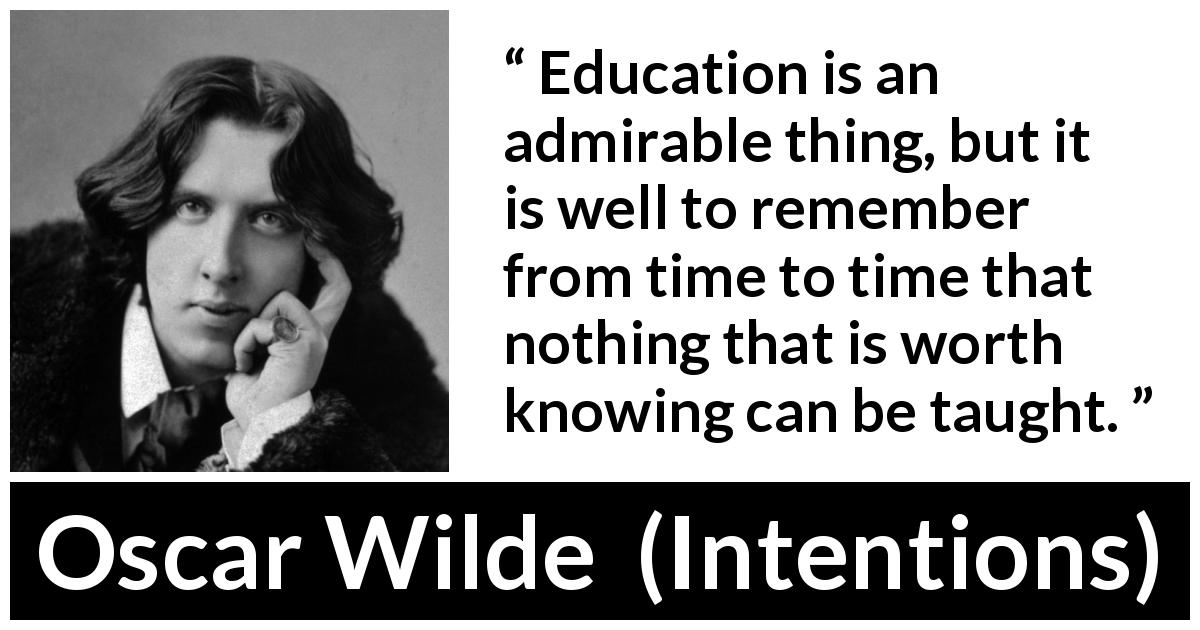
“ Education is an admirable thing, but it is well to remember from time to time that nothing that is worth knowing can be taught. ” Oscar Wilde , Intentions (1891) . copy citation
Meaning and analysis, similar quotes.
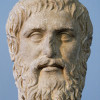
More pictures
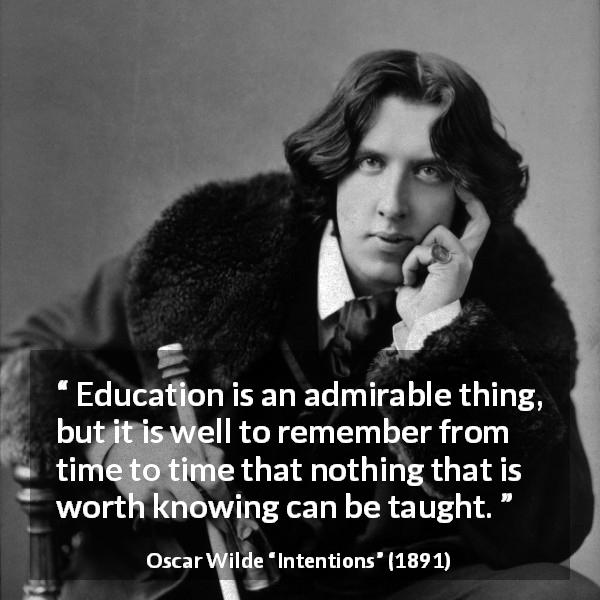
Quote by Oscar Wilde
Education is an admirable thing. but it is well to remember from time to time that nothing that is worth knowing can be taught..
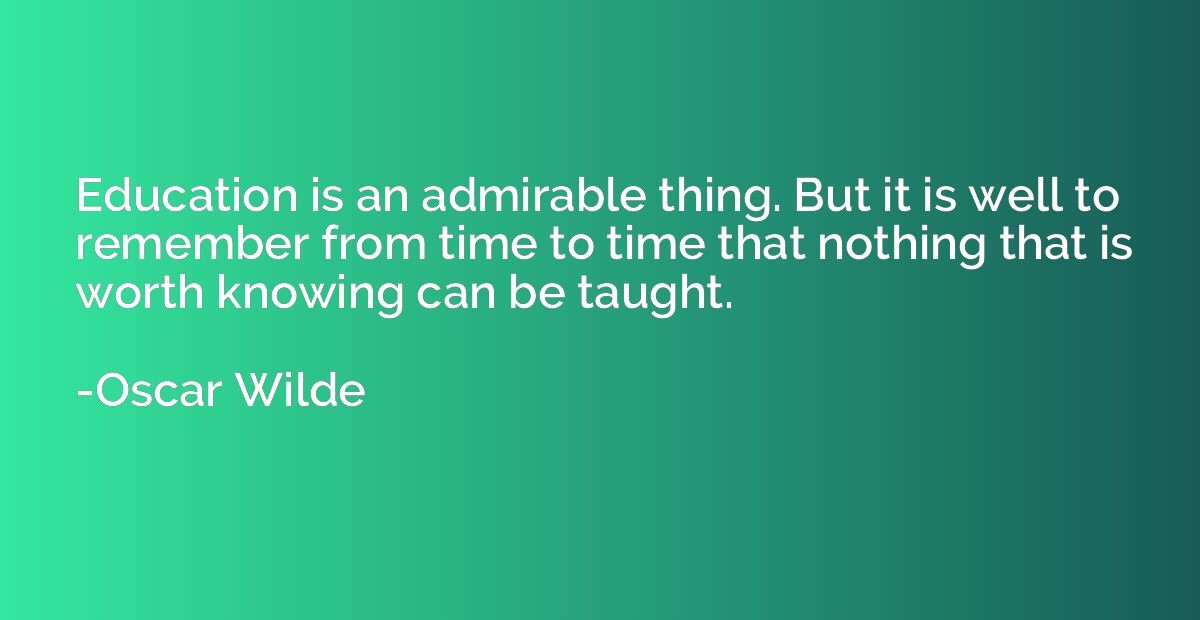
This quote by Oscar Wilde highlights the value and limitations of education. While education is widely praised and seen as important, Wilde reminds us to be mindful that true knowledge often comes from personal experiences and self-discovery. It suggests that there are aspects of life and understanding that can't be fully conveyed through formal instruction alone, emphasizing the importance of individual curiosity, exploration, and learning through lived experiences for the acquisition of truly valuable knowledge.

Random Quotations
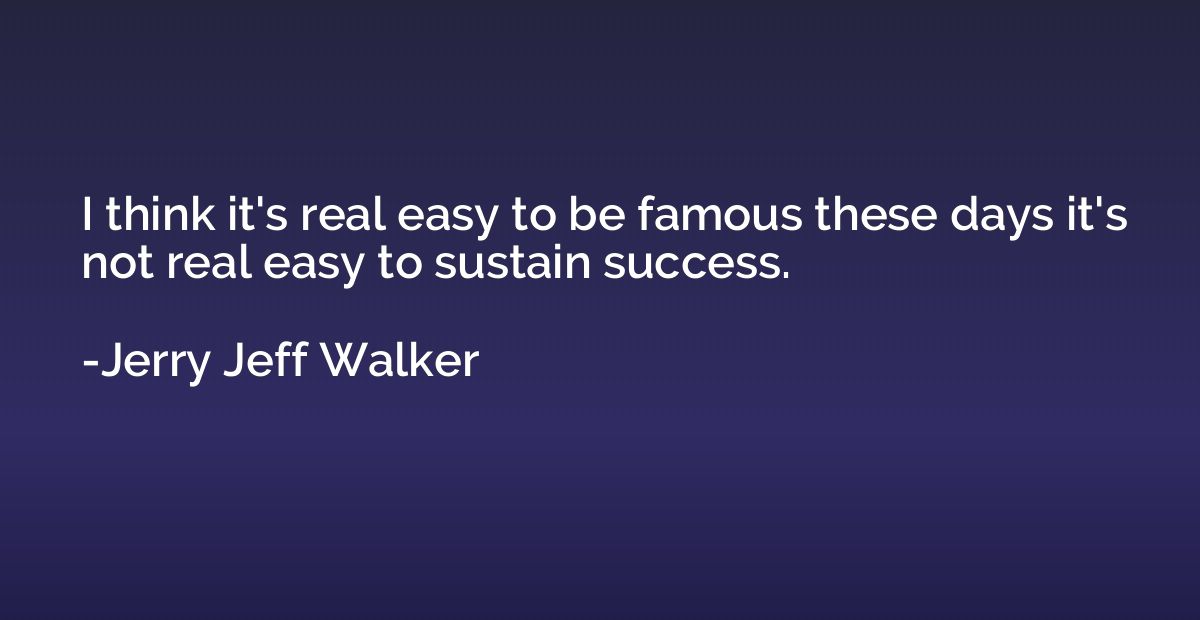
I think it's real easy to be famous these days it's not real easy to sustain success.
Jerry Jeff Walker
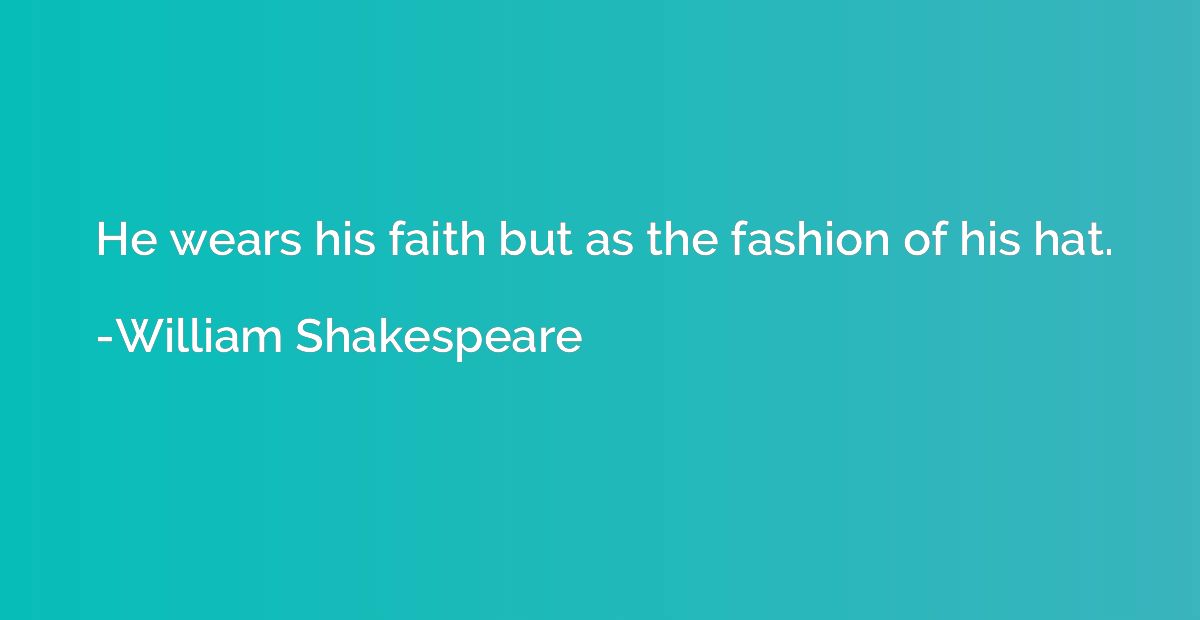
He wears his faith but as the fashion of his hat.
William Shakespeare

You know he loves you, right? (Amanda)Yeah, but emotions don't have brains. (Ash)- About Nick
Sherrilyn Kenyon
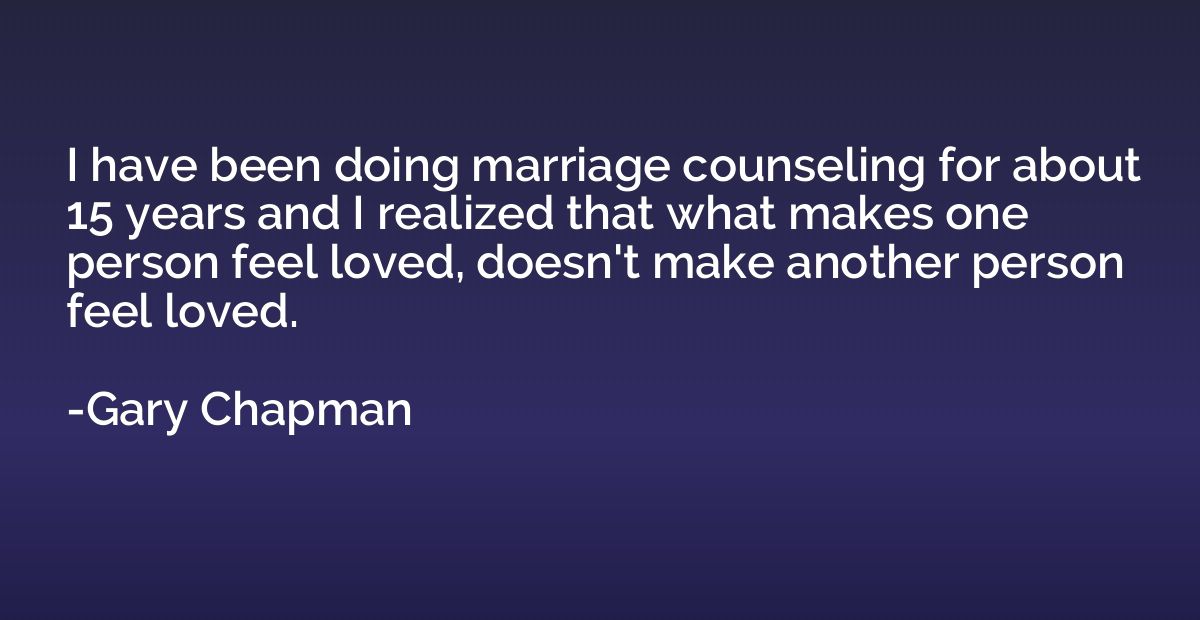
I have been doing marriage counseling for about 15 years and I realized that what makes one person feel loved, doesn't make another person feel loved.
Gary Chapman
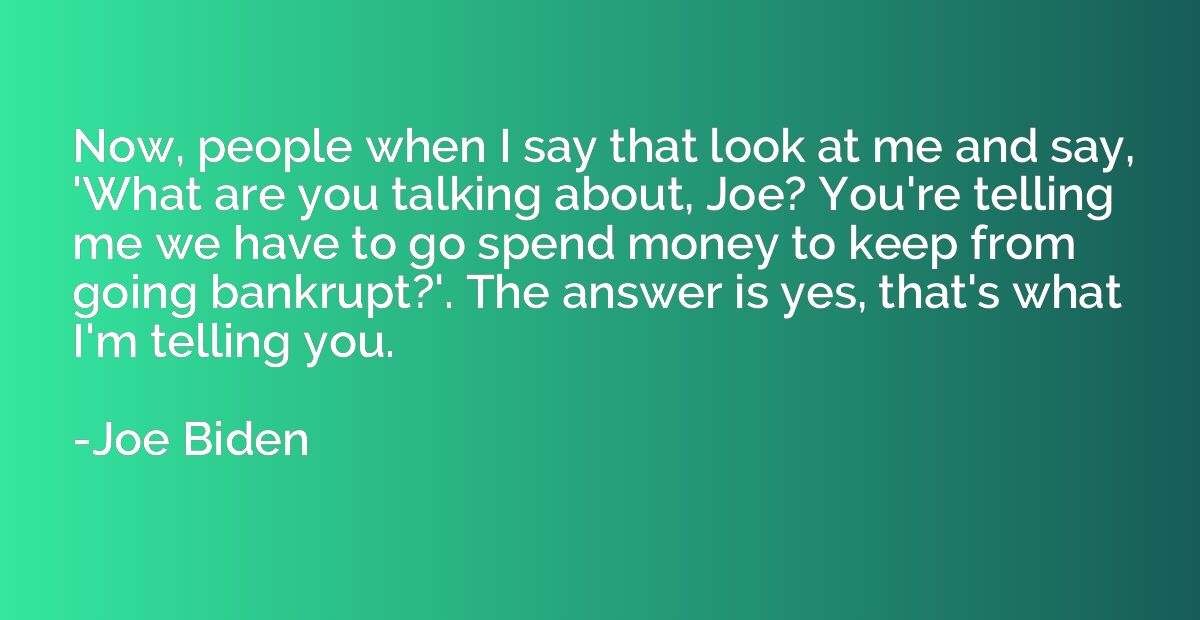
Now, people when I say that look at me and say, 'What are you talking about, Joe? You're telling me we have to go spend money to keep from going bankrupt?'. The answer is yes, that's what I'm telling you.
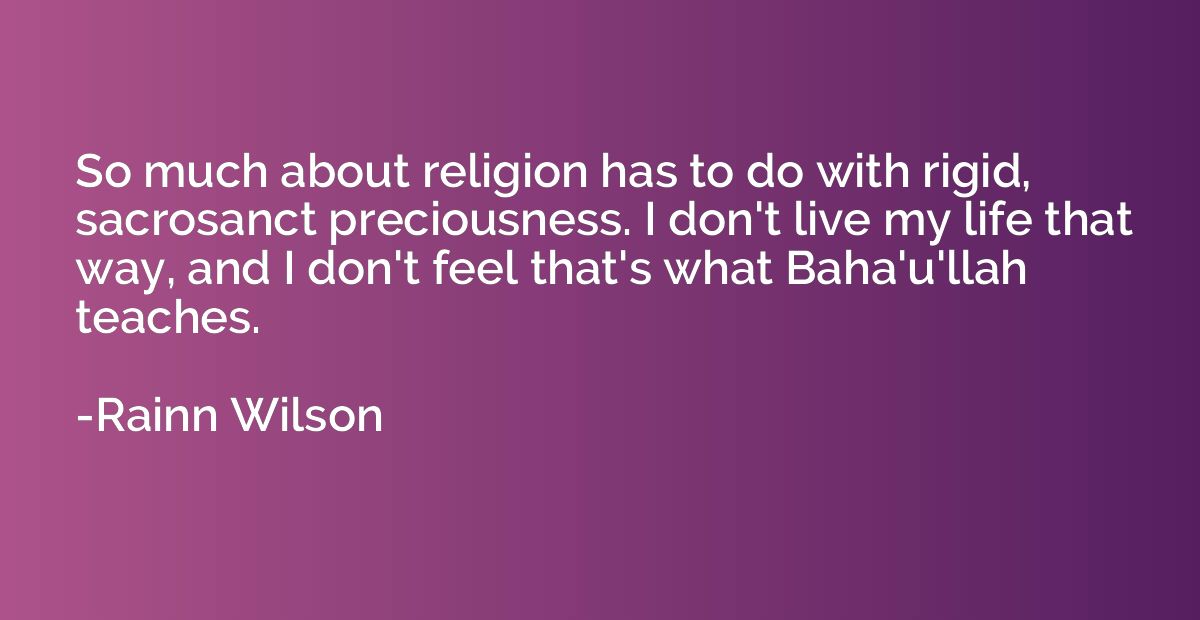
So much about religion has to do with rigid, sacrosanct preciousness. I don't live my life that way, and I don't feel that's what Baha'u'llah teaches.
Rainn Wilson
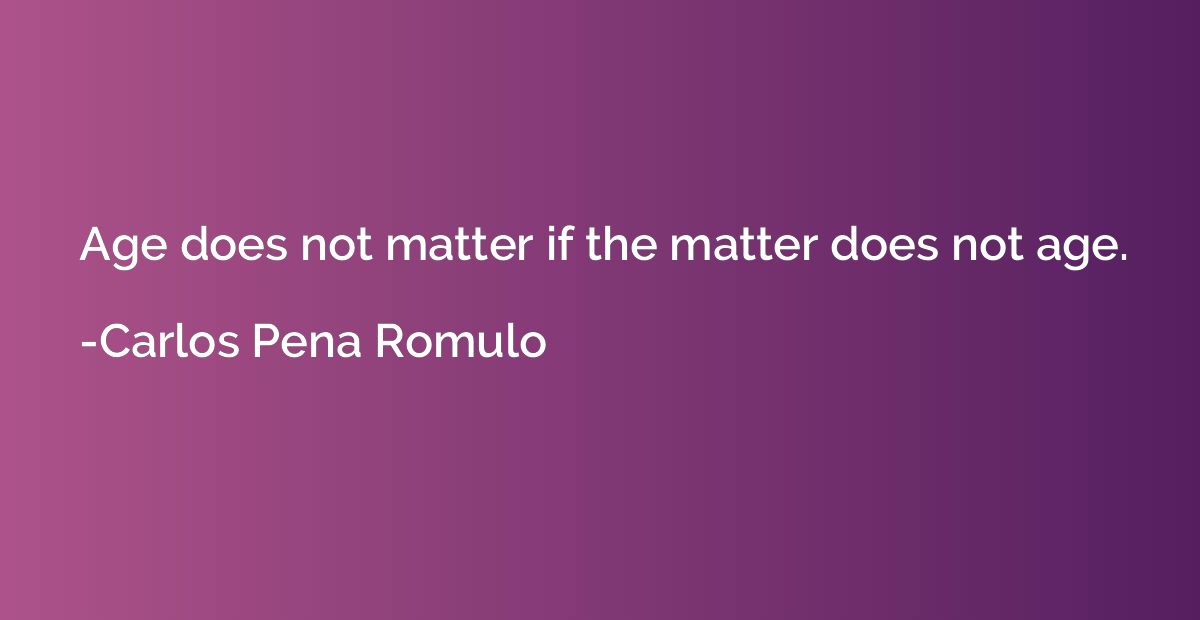
Age does not matter if the matter does not age.
Carlos Pena Romulo
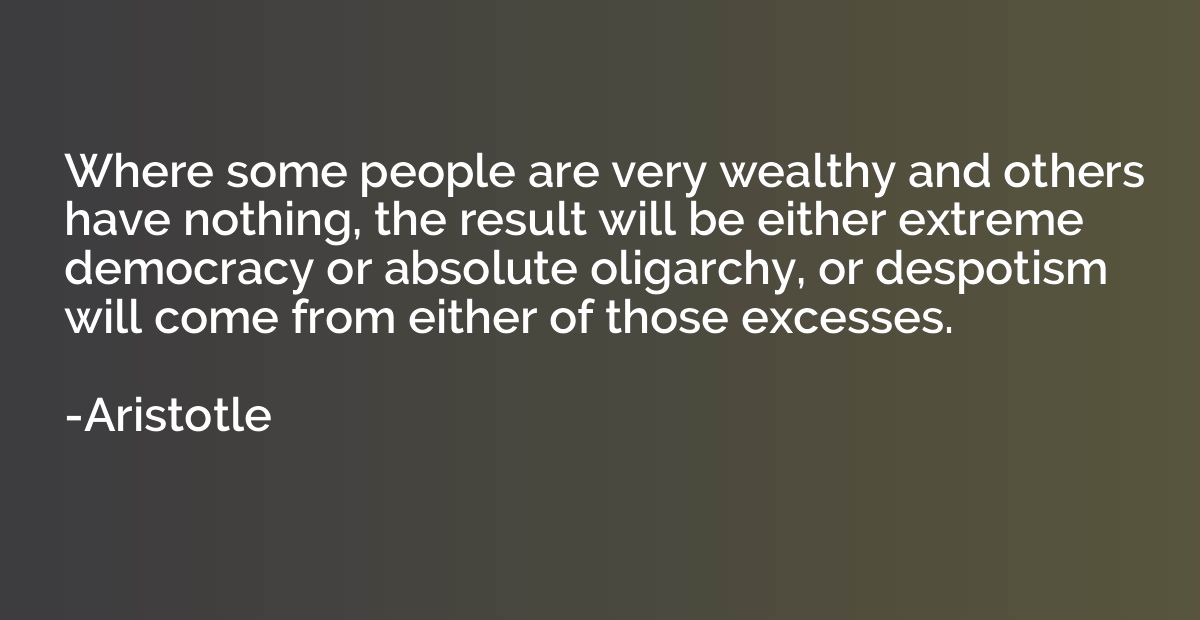
Where some people are very wealthy and others have nothing, the result will be either extreme democracy or absolute oligarchy, or despotism will come from either of those excesses.
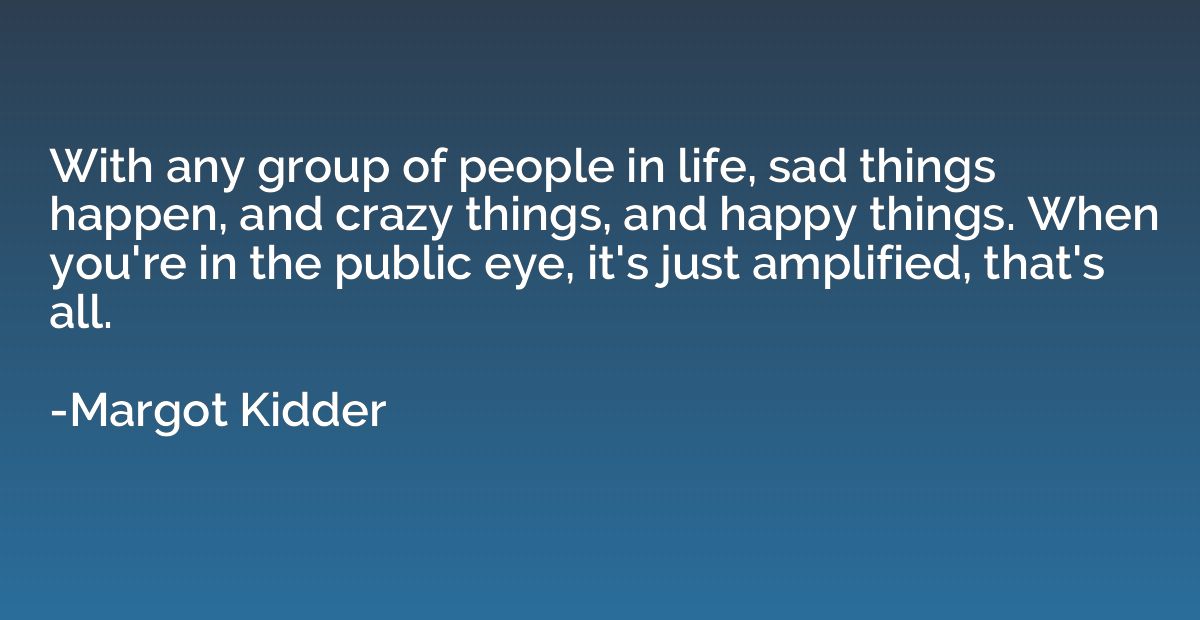
With any group of people in life, sad things happen, and crazy things, and happy things. When you're in the public eye, it's just amplified, that's all.
Margot Kidder
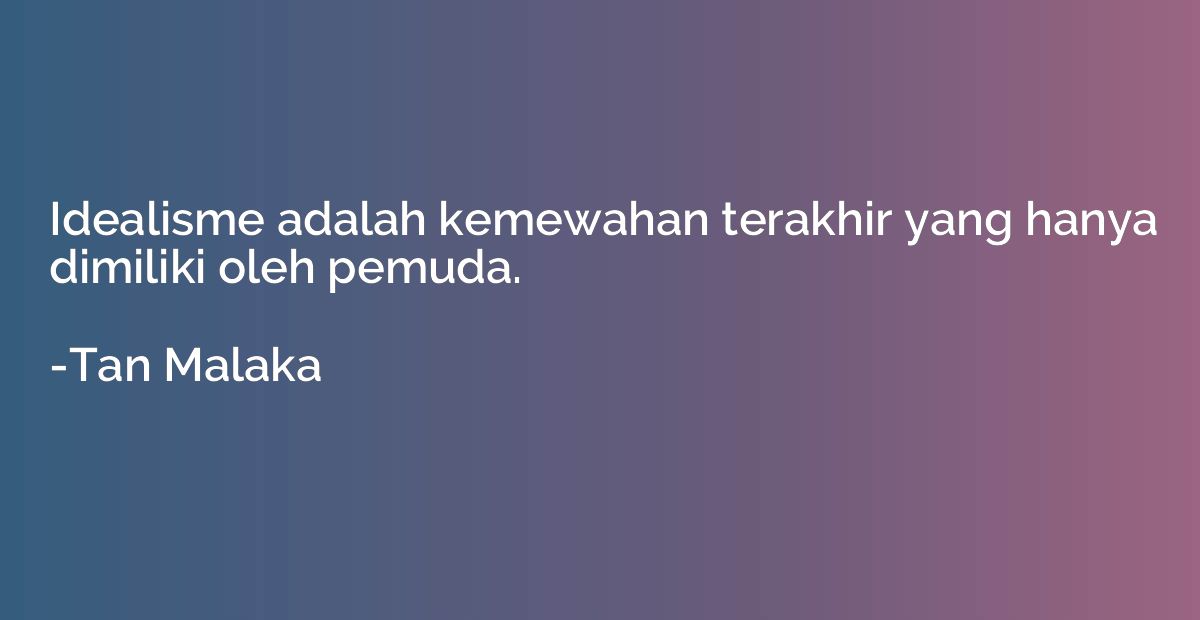
Idealisme adalah kemewahan terakhir yang hanya dimiliki oleh pemuda.
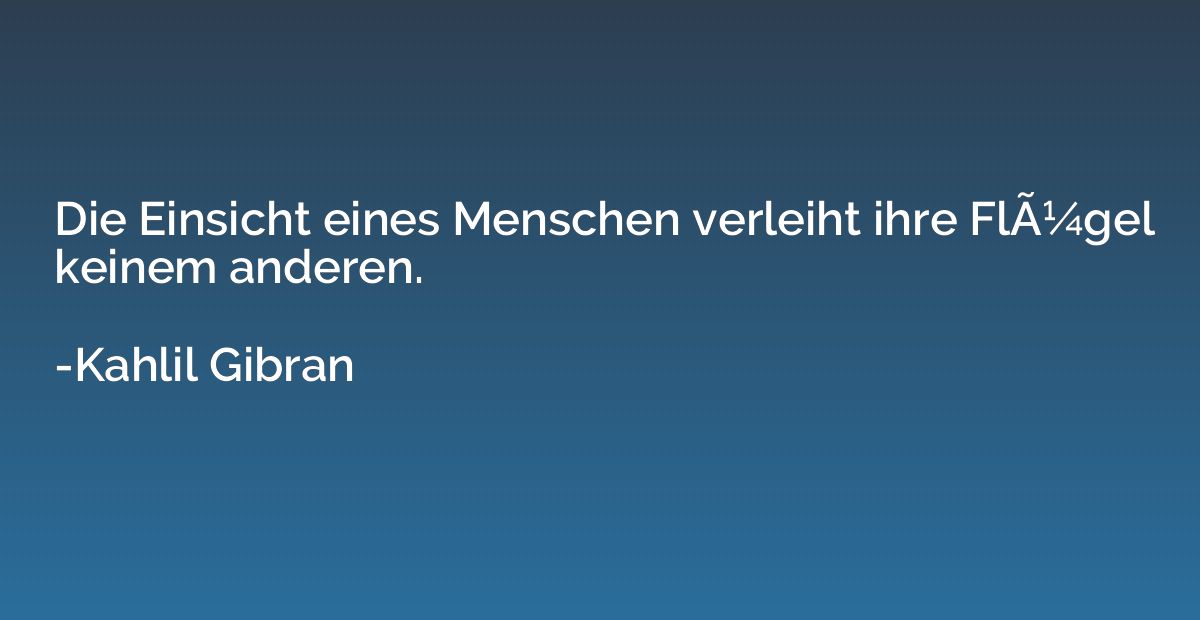
Die Einsicht eines Menschen verleiht ihre Flügel keinem anderen.
Kahlil Gibran
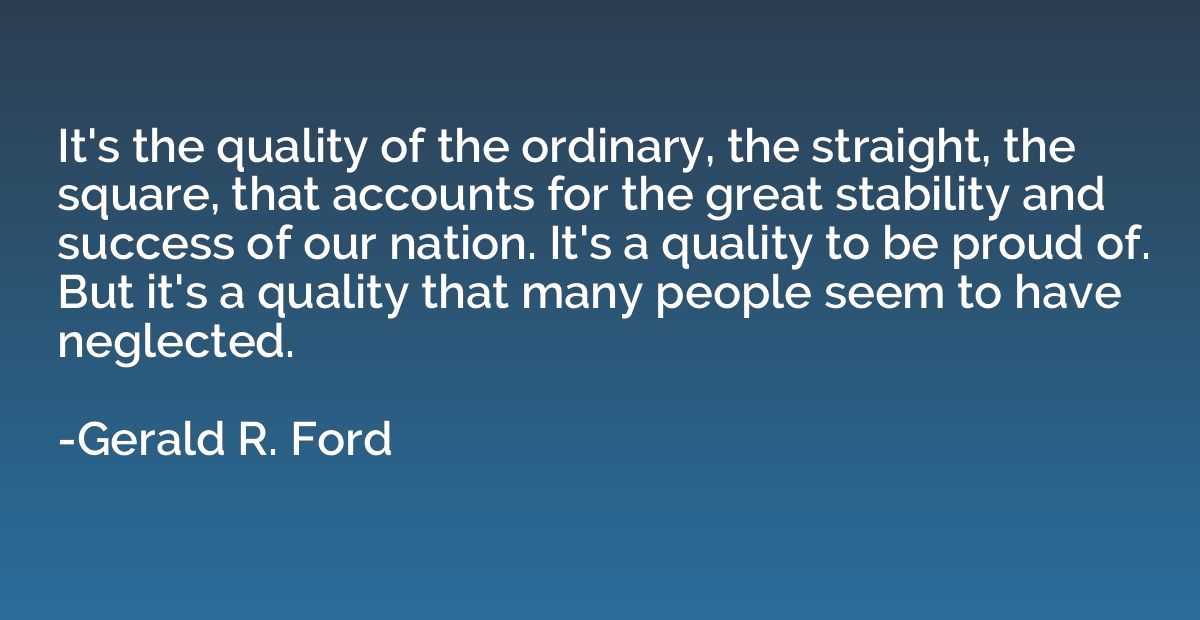
It's the quality of the ordinary, the straight, the square, that accounts for the great stability and success of our nation. It's a quality to be proud of. But it's a quality that many people seem to have neglected.
Gerald R. Ford
20 Pieces Of Wisdom From Oscar Wilde

In 100 years time, how many people will still be quoting you? Okay so, we didn't mean to make you feel inadequate but chances are, the number will be smaller than one.
A hearty round of applause then for Oscar Wilde whose death in 1900 hasn't prevented his wonderful words from living a long and fruitful life.
We've gathered together his 20 greatest pieces of wisdom right here. Let us know if we've missed off your favourite.
“I have the simplest tastes. I am always satisfied with the best.”
“To be great is to be misunderstood.”
“My wallpaper and I are fighting a duel to the death. One or the other of us has to go.”
“To get back my youth I would do anything in the world, except take exercise, get up early, or be respectable.”
“Everything in moderation, including moderation.”
“Always forgive your enemies; nothing annoys them so much.”
“I don’t want to go to heaven. None of my friends are there.”
“Talent borrows, genius steals.”
“Life is too important to be taken seriously.”
"Perhaps, after all, America never has been discovered. I myself would say that it had merely been detected."
“Whenever people agree with me I always feel I must be wrong.”
“I have nothing to declare except my genius.”
“There is only one thing worse than being talked about and that is not being talked about.”
“I was very much disappointed in the Atlantic Ocean. It was very tame. I expected to have it roar about and be beautiful in its storms. I was disappointed in it.”
“Niagara Falls seemed to me to be simply a vast, unnecessary amount of water going the wrong way.”
“Education is an admirable thing, but it is well to remember from time to time that nothing that is worth knowing can be taught.”
“When I was young I thought that money was the most important thing in life; now that I am old I know that it is.”
“Experience is simply the name we give to our mistakes.”
“The difference between literature and journalism is that journalism is unreadable and literature is not read.”
“In all matters of opinion, our adversaries are insane.”
_______________________________________________________
(Image: Rex Features)

OnePlus Nord N10 5G review: 5 things to know

OnePlus 8T review: the monochrome master is back

OnePlus 8 Pro review: 5 things to know about this 5G powerhouse
Related reviews and shortlists.

47-year single malt from ghost distillery hots up Halloween

Severance season 2 trailer: 5 details you might have missed


Lord of the Rings: The Hunt for Gollum won't be two movies

20 songs we can’t believe turn 20 in 2024

11 horror movies coming out in cinemas and streaming this October

The best horror video games you need to play this spooky season
Education is an admirable thing. But it is well to remember from time to time that nothing that is worth knowing can be taught.
A Few Maxims for the Instruction of the Over-Educated (1894)
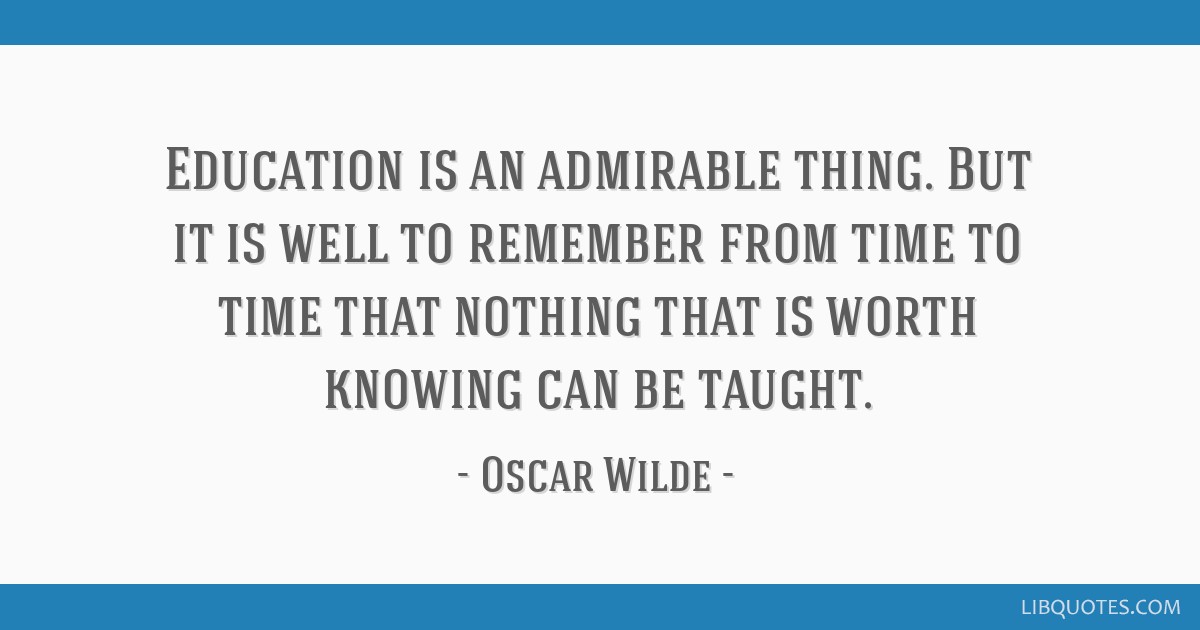
Quote of the day
Oscar wilde.

Featured Authors

Predictions that didn't happen

If it's on the Internet it must be true

Remarkable Last Words (or Near-Last Words)
Picture quotes.

Philip James Bailey

Eleanor Roosevelt

Letitia Elizabeth Landon
Popular topics.
A business journal from the Wharton School of the University of Pennsylvania
Knowledge at Wharton Podcast
‘the objective of education is learning, not teaching’, august 20, 2008 • 14 min listen.
In their book, 'Turning Learning Right Side Up: Putting Education Back on Track,' authors Russell L. Ackoff and Daniel Greenberg point out that today's education system is seriously flawed — it focuses on teaching rather than learning.

- Public Policy

In their book, Turning Learning Right Side Up: Putting Education Back on Track , authors Russell L. Ackoff and Daniel Greenberg point out that today’s education system is seriously flawed — it focuses on teaching rather than learning. “Why should children — or adults — be asked to do something computers and related equipment can do much better than they can?” the authors ask in the following excerpt from the book. “Why doesn’t education focus on what humans can do better than the machines and instruments they create?”
“Education is an admirable thing, but it is well to remember from time to time that nothing that is worth learning can be taught.” — Oscar Wilde
Traditional education focuses on teaching, not learning. It incorrectly assumes that for every ounce of teaching there is an ounce of learning by those who are taught. However, most of what we learn before, during, and after attending schools is learned without its being taught to us. A child learns such fundamental things as how to walk, talk, eat, dress, and so on without being taught these things. Adults learn most of what they use at work or at leisure while at work or leisure. Most of what is taught in classroom settings is forgotten, and much or what is remembered is irrelevant.
In most schools, memorization is mistaken for learning. Most of what is remembered is remembered only for a short time, but then is quickly forgotten. (How many remember how to take a square root or ever have a need to?) Furthermore, even young children are aware of the fact that most of what is expected of them in school can better be done by computers, recording machines, cameras, and so on. They are treated as poor surrogates for such machines and instruments. Why should children — or adults, for that matter — be asked to do something computers and related equipment can do much better than they can? Why doesn’t education focus on what humans can do better than the machines and instruments they create?
When those who have taught others are asked who in the classes learned most, virtually all of them say, “The teacher.” It is apparent to those who have taught that teaching is a better way to learn than being taught. Teaching enables the teacher to discover what one thinks about the subject being taught. Schools are upside down: Students should be teaching and faculty learning.
After lecturing to undergraduates at a major university, I was accosted by a student who had attended the lecture. After some complimentary remarks, he asked, “How long ago did you teach your first class?”
I responded, “In September of 1941.”
“Wow!” The student said. “You mean to say you have been teaching for more than 60 years?”
“Yes.”
“When did you last teach a course in a subject that existed when you were a student?”
This difficult question required some thought. After a pause, I said, “September of 1951.”
“Wow! You mean to say that everything you have taught in more than 50 years was not taught to you; you had to learn on your own?”
“Right.”
“You must be a pretty good learner.”
I modestly agreed.
The student then said, “What a shame you’re not that good a teacher.”
The student had it right; what most faculty members are good at, if anything, is learning rather than teaching. Recall that in the one-room schoolhouse, students taught students. The teacher served as a guide and a resource but not as one who force-fed content into students’ minds.
Ways of Learning
There are many different ways of learning; teaching is only one of them. We learn a great deal on our own, in independent study or play. We learn a great deal interacting with others informally — sharing what we are learning with others and vice versa. We learn a great deal by doing, through trial and error. Long before there were schools as we know them, there was apprenticeship — learning how to do something by trying it under the guidance of one who knows how. For example, one can learn more architecture by having to design and build one’s own house than by taking any number of courses on the subject. When physicians are asked whether they leaned more in classes or during their internship, without exception they answer, “Internship.”
In the educational process, students should be offered a wide variety of ways to learn, among which they could choose or with which they could experiment. They do not have to learn different things the same way. They should learn at a very early stage of “schooling” that learning how to learn is largely their responsibility — with the help they seek but that is not imposed on them.
The objective of education is learning, not teaching.
There are two ways that teaching is a powerful tool of learning. Let’s abandon for the moment the loaded word teaching, which is unfortunately all too closely linked to the notion of “talking at” or “lecturing,” and use instead the rather awkward phrase explaining something to someone else who wants to find out about it. One aspect of explaining something is getting yourself up to snuff on whatever it is that you are trying to explain. I can’t very well explain to you how Newton accounted for planetary motion if I haven’t boned up on my Newtonian mechanics first. This is a problem we all face all the time, when we are expected to explain something. (Wife asks, “How do we get to Valley Forge from home?” And husband, who does not want to admit he has no idea at all, excuses himself to go to the bathroom; he quickly Googles Mapquest to find out.) This is one sense in which the one who explains learns the most, because the person to whom the explanation is made can afford to forget the explanation promptly in most cases; but the explainers will find it sticking in their minds a lot longer, because they struggled to gain an understanding in the first place in a form clear enough to explain.
The second aspect of explaining something that leaves the explainer more enriched, and with a much deeper understanding of the subject, is this: To satisfy the person being addressed, to the point where that person can nod his head and say, “Ah, yes, now I understand!” explainers must not only get the matter to fit comfortably into their own worldview, into their own personal frame of reference for understanding the world around them, they also have to figure out how to link their frame of reference to the worldview of the person receiving the explanation, so that the explanation can make sense to that person, too. This involves an intense effort on the part of the explainer to get into the other person’s mind, so to speak, and that exercise is at the heart of learning in general. For, by practicing repeatedly how to create links between my mind and another’s, I am reaching the very core of the art of learning from the ambient culture. Without that skill, I can only learn from direct experience; with that skill, I can learn from the experience of the whole world. Thus, whenever I struggle to explain something to someone else, and succeed in doing so, I am advancing my ability to learn from others, too.
Learning through Explanation
This aspect of learning through explanation has been overlooked by most commentators. And that is a shame, because both aspects of learning are what makes the age mixing that takes place in the world at large such a valuable educational tool. Younger kids are always seeking answers from older kids — sometimes just slightly older kids (the seven-year-old tapping the presumed life wisdom of the so-much-more-experienced nine-year-old), often much older kids. The older kids love it, and their abilities are exercised mightily in these interactions. They have to figure out what it is that they understand about the question being raised, and they have to figure out how to make their understanding comprehensible to the younger kids. The same process occurs over and over again in the world at large; this is why it is so important to keep communities multi-aged, and why it is so destructive to learning, and to the development of culture in general, to segregate certain ages (children, old people) from others.
What went on in the one-room schoolhouse is much like what I have been talking about. In fact, I am not sure that the adult teacher in the one-room schoolhouse was always viewed as the best authority on any given subject! Long ago, I had an experience that illustrates that point perfectly. When our oldest son was eight years old, he hung around (and virtually worshiped) a very brilliant 13-year-old named Ernie, who loved science. Our son was curious about everything in the world. One day he asked me to explain some physical phenomenon that lay within the realm of what we have come to call “physics”; being a former professor of physics, I was considered a reasonable person to ask. So, I gave him an answer — the “right” answer, the one he would have found in books. He was greatly annoyed. “That’s not right!” he shouted, and when I expressed surprise at his response, and asked him why he would say so, his answer was immediate: “Ernie said so and so, which is totally different, and Ernie knows.” It was an enlightening and delightful experience for me. It was clear that his faith in Ernie had been developed over a long time, from long experience with Ernie’s unfailing ability to build a bridge between their minds — perhaps more successfully, at least in certain areas, than I had been.
One might wonder how on earth learning came to be seen primarily a result of teaching. Until quite recently, the world’s great teachers were understood to be people who had something fresh to say about something to people who were interested in hearing their message. Moses, Socrates, Aristotle, Jesus — these were people who had original insights, and people came from far and wide to find out what those insights were. One can see most clearly in Plato’s dialogues that people did not come to Socrates to “learn philosophy,” but rather to hear Socrates’ version of philosophy (and his wicked and witty attacks on other people’s versions), just as they went to other philosophers to hear (and learn) their versions. In other words, teaching was understood as public exposure of an individual’s perspective, which anyone could take or leave, depending on whether they cared about it.
No one in his right mind thought that the only way you could become a philosopher was by taking a course from one of those guys. On the contrary, you were expected to come up with your own original worldview if you aspired to the title of philosopher. This was true of any and every aspect of knowledge; you figured out how to learn it, and you exposed yourself to people who were willing to make their understanding public if you thought it could be a worthwhile part of your endeavor. That is the basis for the formation of universities in the Middle Ages — places where thinkers were willing to spend their time making their thoughts public. The only ones who got to stay were the ones whom other people (“students”) found relevant enough to their own personal quests to make listening to them worthwhile.
By the way, this attitude toward teaching has not disappeared. When quantum theory was being developed in the second quarter of the twentieth century, aspiring atomic physicists traveled to the various places where different theorists were developing their thoughts, often in radically different directions. Students traveled to Bohr’s institute to find out how he viewed quantum theory, then to Heisenberg, to Einstein, to Schrodinger, to Dirac, and so on. What was true of physics was equally true of art, architecture…you name it. It is still true today. One does not go to Pei to learn “architecture”; one goes to learn how he does it — that is, to see him “teach” by telling and showing you his approach. Schools should enable people to go where they want to go, not where others want them to.
Malaise of Mass Education
The trouble began when mass education was introduced. It was necessary…
- To decide what skills and knowledge everyone has to have to be a productive citizen of a developed country in the industrial age
- To make sure the way this information is defined and standardized, to fit into the standardization required by the industrial culture
- To develop the means of describing and communicating the standardized information (textbooks, curricula)
- To train people to comprehend the standardized material and master the means of transmitting it (teacher training, pedagogy)
- To create places where the trainees (children) and the trainers (unfortunately called teachers, which gives them a status they do not deserve) can meet — so-called schools (again a term stolen from a much different milieu, endowing these new institutions with a dignity they also do not deserve)
- And, to provide the coercive backing necessary to carry out this major cultural and social upheaval
In keeping with all historic attempts to revolutionize the social order, the elite leaders who formulated the strategy, and those who implemented it, perverted the language, using terms that had attracted a great deal of respect in new ways that turned their meanings upside down, but helped make the new order palatable to a public that didn’t quite catch on. Every word — teacher, student, school, discipline, and so on — took on meanings diametrically opposed to what they had originally meant.
Consider this one example from my recent experience. I attended a conference of school counselors, where the latest ideas in the realm of student counseling were being presented. I went to a session on the development of self-discipline and responsibility, wondering what these concepts mean to people embedded in traditional schooling. To me, self-discipline means the ability to pursue one’s goals without outside coercion; responsibility means taking appropriate action on one’s own initiative, without being goaded by others. To the people presenting the session, both concepts had to do solely with the child’s ability to do his or her assigned classwork. They explained that a guidance counselor’s proper function was to get students to understand that responsible behavior meant doing their homework in a timely and effective manner, as prescribed, and self-discipline meant the determination to get that homework done. George Orwell was winking in the back of the room.
Today, there are two worlds that use the word education with opposite meanings: one world consists of the schools and colleges (and even graduate schools) of our education complex, in which standardization prevails. In that world, an industrial training mega-structure strives to turn out identical replicas of a product called “people educated for the twenty-first century”; the second is the world of information, knowledge, and wisdom, in which the real population of the world resides when not incarcerated in schools. In that world, learning takes place like it always did, and teaching consists of imparting one’s wisdom, among other things, to voluntary listeners.
More From Knowledge at Wharton

How Election Tax Plans Affect Your Paycheck | Kent Smetters

The Role of Firms in Immigration and Economic Prosperity | Britta Glennon

Healthcare Showdown: How Each Presidential Candidate’s Plan Will Shape America’s Future
Looking for more insights.
Sign up to stay informed about our latest article releases.
- Quote of the Day
- Picture Quotes
Education is an admirable thing.
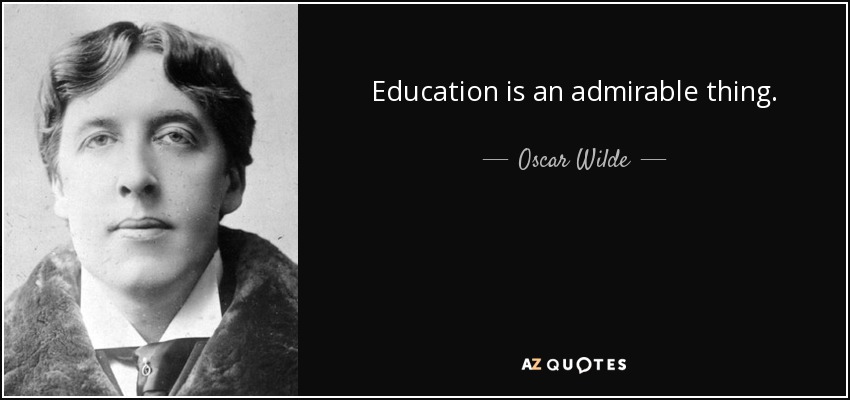
Popular Topics
- Inspirational
- Motivational
Related Authors

Send Report
- The author didn't say that
- There is a mistake in the text of this quote
- The quote belongs to another author
- Other error
- Javascript and RSS feeds
- WordPress plugin
- ES Version AZQuotes.ES
- Submit Quotes
- Privacy Policy
Login with your account
Create account, find your account.

- Quotes to your Site
- My Quote List
- "It is perfectly monstrous the way people go about, nowadays, saying things against one behind one's back that are absolutely and entirely true."
- "One can always be kind to people about whom one cares nothing."
- "There is luxury in self-reproach. When we blame ourselves, we feel no one else has a right to blame us."
- "A kiss may ruin a human life."
- "It often happens that the real tragedies of life occur in such an inartistic manner that they hurt us by their crude violence, their absolute incoherence, their absurd want of meaning, their entire lack of style."
- "The small part of ignorance that we arrange and classify we give the name of knowledge."
- "A man doesn't know what he knows until he knows what he doesn't know."
- "Learning has been [a] great loser by being shut up in colleges and cells and secluded from the world and good company."
- "Education is an admirable thing, but it is well to remember from time to time that nothing that is worth knowing can be taught."
- "Beware of the man who works hard to learn something, learns it, and finds himself no wiser than before. He is full of murderous resentment of people who are ignorant without having come by their ignorance the hard way."

COMMENTS
Summary: Oscar Wilde's quote, "Education is an admirable thing, but it is well to remember from time to time that nothing that is worth knowing can be taught," highlights the idea that education should not solely rely on imparting knowledge but should also promote the development of critical thinking skills and personal experiences. It serves ...
The philosophy of the school room in one generation will be the philosophy of government in the next. Education's purpose is to replace an empty mind with an open one. A person who won't read has no advantage over one who can't read. "Education is an admirable thing, but it is well..." - Oscar Wilde quotes from BrainyQuote.com.
Education is an admirable thing, but it is well to remember from time to time that nothing that is worth knowing can be taught. Oscar Wilde. Graduation, Education, Time. ... The mind of the thoroughly well-informed man is a dreadful thing. It is like a bric-à-brac shop, all monsters and dust, with everything priced above its proper value ...
Mr. Wilde starts off by saying, education is an admirable thing. In his context, education means formal education or schooling. Then he adds that there are things that worth knowing in life which cannot be taught. Oscar Wilde agreed that education is excellent or commendable. He then interposes " it is well to remember ".
Education is an admirable thing, but it is well to remember from time to time that nothing that is worth knowing can be taught. Intentions (1891) 'The Critic as Artist' pt. 1. A little sincerity is a dangerous thing, and a great deal of it is absolutely fatal.
Education is an admirable thing. But it is well to remember from time to time that nothing that is worth knowing can be taught. Public opinion exists only where there are no ideas. The English are always degrading truths into facts. When a truth becomes a fact it loses all its intellectual value.
Education is an admirable thing, but it is well to remember from time to time that nothing that is worth knowing can be taught. Oscar Wilde 1854-1900 Irish dramatist and poet: Intentions (1891) 'The Critic as Artist' pt. 1. One child, one teacher, one book and one pen can change the world. Education is the only solution.
Education is an admirable thing, but it is well to remember from time to time that nothing that is worth knowing can be taught. Oscar Wilde. Favorite. Epigrams: Phrases and Philosophies for the Use of the Young Sebastian Melmoth. ← Prev Oscar Wilde Quotes Next →.
Education is an admirable thing. But it is well to remember from time to time that nothing that is worth knowing can be taught. Oscar Wilde , (1854 - 1900) Playwright & Wit A Few Maxims For The Instruction Of The Over-Educated (1894) Be yourself. Everyone else is already taken.
Education is an admirable thing, but it is well to remember from time to time that nothing that is worth knowing can be taught. Through the parted curtains of the window I see the moon like a clipped piece of silver. Like gilded bees the stars cluster round her. The sky is a hard hollow sapphire. Let us go out into the night.
Education is an admirable thing. But it is well to remember from time to time that nothing that is worth knowing can be taught. Summary. This quote by Oscar Wilde highlights the value and limitations of education. While education is widely praised and seen as important, Wilde reminds us to be mindful that true knowledge often comes from ...
"Education is an admirable thing, but it is well to remember from time to time that nothing that is worth knowing can be taught." "When I was young I thought that money was the most important thing in life; now that I am old I know that it is." "Experience is simply the name we give to our mistakes."
Education is an admirable thing. But it is well to remember ... A Few Maxims for the Instruction of the Over-Educated (1894) 100% Sourced Quotes. Our motto is: Don't quote it if you can't source it. Oscar Wilde quote: Education is an admirable thing. But it is well to remember from time to time that nothing that is worth knowing can be taught.
"Education is an admirable thing, but it is well to remember from time to time that nothing that is worth learning can be taught." — Oscar Wilde. Traditional education focuses on teaching ...
Explore quotes by Oscar Wilde: 'Education is an admirable thing, but it is well to rememb...', seamlessly connecting global voices through Multilingual Translation, available on OpenL Library.
Quotes › Authors › O › Oscar Wilde › Education is an admirable thing. Education is an admirable thing. Oscar Wilde. Favorite. Epigrams: Phrases and Philosophies for the Use of the Young Sebastian Melmoth ← Prev Oscar Wilde Quotes Next →. facebook; twitter; googleplus; email ...
"Education is an admirable thing, but it is well to remember from time to time that nothing that is worth knowing can be taught." "Beware of the man who works hard to learn something, learns it, and finds himself no wiser than before. He is full of murderous resentment of people who are ignorant without having come by their ignorance the hard way."
Education according to Oscar Wilde. June 25, 2021. For many years I've thought that while Oscar Wilde's pronouncements on education are very humorous, not to say cynical, they also contain an element of truth. Quite a large element, unfortunately. Here are a few of my favourite quotes, with some words of commentary from myself.